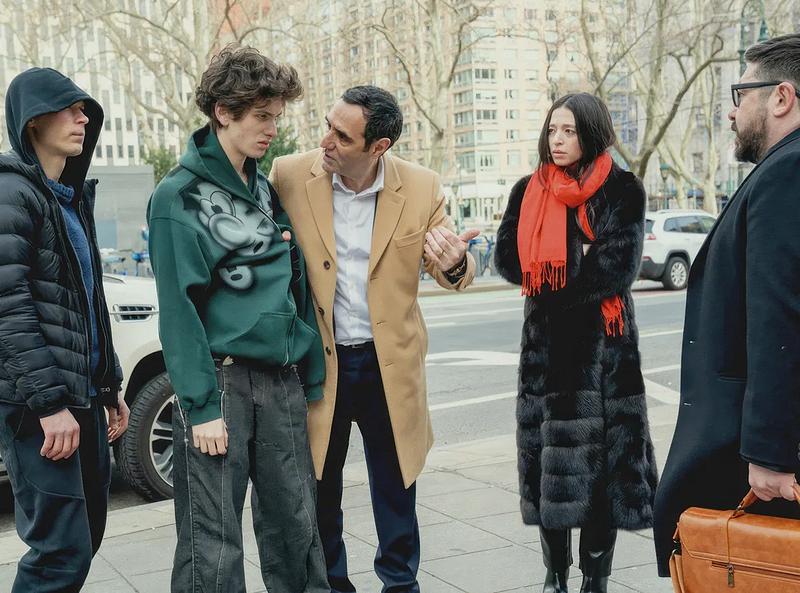
Anora
is a Cinderella story that goes from rags to riches and back from riches to rags. Director-writer Sean Baker ties it together with a cohesively authentic script that turns this sparkling dress of a film inside out so that the tag is showing.
Anora (Mikey Madison) — if you couldn’t tell by the accent — is a thoroughbred Brooklyn, New Yorker from Brighton Beach. She dances every night at the HQ and occasionally does some extracurriculars if the price is right. One night, she is specifically requested by a patron who happens to be the son of a Russian oligarch, as she is the only Russian speaker in the club. Except she cannot speak it fluently and can only understand it. This one-sided communication between her and Ivan (Mark Eidelstein) would have been obvious beyond the language barrier. Ivan talks like a Beretta with a scrunchie holding the trigger tight, often barely completing a thought — in Russian or English — and rarely directly acknowledging what another person says to him.
Anora essentially becomes Ivan’s last ode to American culture: a roller-coaster ride before leaving the amusement park. Ivan tests out American slang, style and hits all the iconic checkpoints, from Las Vegas to clubbing in Manhattan. Anora believes that his journey is personal, that he was doing it with her because of love between them, but it becomes clear that he is a cultural imperialist. He wants to indulge in all the American vices that are out of reach for an average citizen but are embedded in his lifestyle. Ivan’s bubble of wealth has disaffected him to what normal responsibilities and emotions feel like. The culmination of which is marrying Anora and inviting her to live with him under the façade that he is her provider, when in reality it is his parents that are bankrolling his debauchery. Everything about Ivan is fake and everything about Anora is real. In what gets literally lost in verbal translation between the pair, Baker masterfully fills in these gaps with physical and visual humor with a twinge of despair.
While Madison provides a virtuoso performance that should rightfully thrust her into a new light,
Anora
truly is an ensemble piece. Toros (Karren Karagulian), Garnick (Vache Tovmasyan) and Igor (Yuriy Borisov) are the Three Stooges if they were Russian gangsters. Toros is stuck in the past of when mafias had enigmatic intimidation power; Garnick spends the entire night struggling to stay conscious after getting beat up by Anora in a failed kidnapping; and Igor, while still hilarious in how he omits reaction to any act of the film’s absurdity, is the moral compass of
Anora
.
Baker takes his time exploring every avenue of the set pieces that he creates for each stage of the film. Sometimes spending upwards of 20 minutes in a single setting at a time, the film’s golden crutch is its dialogue. It is fast-paced, expletive-filled, snarky and self-consciously charming all at once. But even all these highlights could be dulled by boring cinematography and visual geography, which is why the film’s camera-work is so critical.
Anora
’s cinematography occasionally blurs out front-stage high-tension exchanges to focus on individual background faces, usually Igor’s, to convey the third-party perspective on this spiraling tragedy. Speech continues, absent the speaker themself, while the camera focuses on who they are talking to. The film feels so untouchable and intangible at times because of how wholly unrelatable it is on a surface level, but is made more empathetically tangible by its subversive moments of sincerity.
There is also something to say about Baker’s consistent ability to shine a light on those who are often left in the country’s narrative dark. Sex work and sexual promiscuity has been a throughline between Baker’s works that include
Tangerine
(2015),
The Florida Project
(2017),
Red Rocket
(2021) and now
Anora
, but more specifically bringing environments that are seen as the depths of American society to the foreground to suggest they are more ubiquitous than we think. Instead of portraying HQ in
Anora
as a sleazy strip-club that is an individual expression of self-disrespect on behalf of its dancers, Baker insists that it takes two to tango. There is no sex worker without the rich, unhappy man buying their services and perpetuating the cycle.
I went to a screening of
Anora
that was followed by a Q&A joined by Baker, Madison and Karagulian, where Baker was asked how he manages to gain the trust of first-time actors, as well as the actual sex-workers in the films. Baker explained that the fact that they saw him as willing to employ them in this light was enough of a good faith indicator, but that it was a group effort as well; for example, Madison shadowed pole-dancers and learned how to authentically twerk (her words). While this may seem like a shallow evaluation from Baker, the fact that he sees these women as regular, human employees rather than eye-candy-for-hire conveys the realism that he sought to attain with language, visuals and plot in this film. Baker is ultimately a humanitarian that is trying to provide voices for the unspoken through his films, and
Anora
is another successful feather in his cap.
















